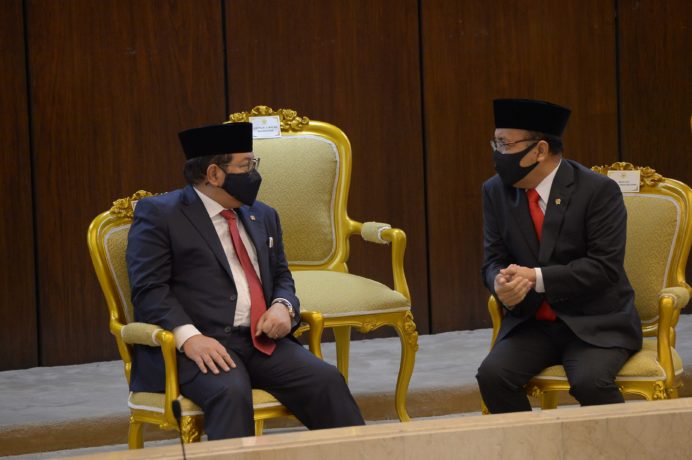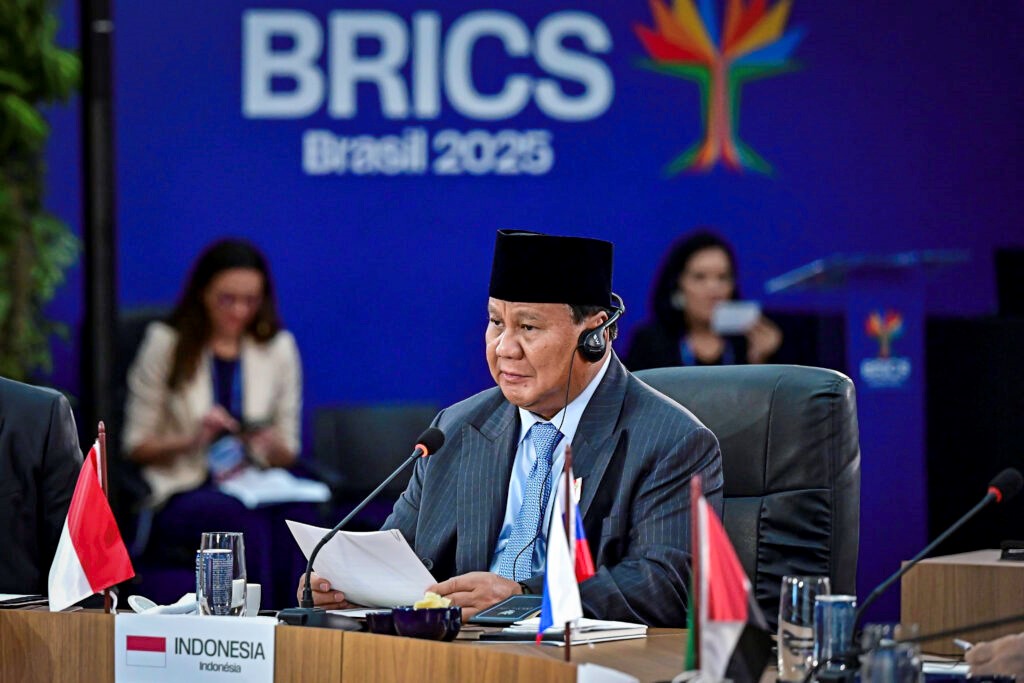Indonesia Must Achieve Great Progress at its Centenary, President Jokowi Says

Cabinet Secretary and Minister of State Secretary accompany the President during State of the Nation Address in Jakarta, Friday (14/8). Photo by: the House of Representatives (DPR)
Indonesia has 25 years left to usher in the centenary of the independence, achieve great progress, and build the country that the people aspire to be, President Joko “Jokowi” Widodo has said.
“Our current goal is not only to escape the pandemic and to get through the crisis. We are taking measures to make a big leap by making the most of the momentum of the ongoing crisis. The crisis has given us a momentum to catch up, to make a major transformation by implementing grand strategies,” the President said during State of the Nation Address of the President of the Republic of Indonesia at the Annual Session of the People’s Consultative Assembly (MPR) of the Republic of Indonesia and the Joint Session of the House of the Representatives (DPR) of the Republic of Indonesia and the Regional Representatives Council (DPD) of the Republic of Indonesia on the Occasion of the 75th Anniversary of the Proclamation of Independence of the Republic of Indonesia in Jakarta, Friday (14/8).
The President also said that the nation must resolve fundamental problems that it is facing, and make a big leap for a significant progress. “We must make the most of this crisis. We must simultaneously and concurrently capitalize on this momentum. We must make Indonesia to be on par with other countries. We must make our country become an Advanced Indonesia that we aspire to be,“ the President said.
In the meantime, the President said that amid various technical difficulties during pandemic, the Audit Board of the Republic of Indonesia (BPK) is still able to audit and submit 1,180 audit reports (LHP) of 2019 quickly and thoroughly, provide 36,000 recommendations to the Government, and instruct deposit to the state treasury for Rp1.39 trillion.
Those hard internal duties, the President added, did not affect the BPK’s agenda to maintain its role as an external auditor for the International Organizations and as a member of the Independent Audit Advisory Committee under the United Nations.
“Likewise, the Supreme Court (MA) still guarantees the quick trials service during the pandemic, providing virtual trials service through e-court and e-litigasi applications that have accelerated trials other than public and face-to-face trials,” the President stated.
The President also said that in a bid to expand access for justice seekers, the Supreme Court continues to improve post service of legal assistance and modernizes case management through electronic court service. It brings success for the Supreme Court in reducing the number of unsolved cases significantly.
“The success of the Supreme Court is thanks to the support of the Judicial Commission (KY), which is in accordance with the Commission’s authority. The nominations of Supreme Court justice candidates, anti-corruption ad hoc justice candidates, and industrial relations ad hoc justice candidates continue to proceed smoothly. By the same token, the implementation of programs for improving the capacity of justices, court monitoring, investigation and advocacy for justices also continue to advance,” the President said.
The President went on to say that from the period of 2019 to June 2020, the Judicial Commission handled 1,584 public reports, of which 225 sanctions were recommended to impose.
“The speed and accuracy of the Constitutional Court (MK) truly deserve our appreciation. The Constitutional Court continues to improve its governance and the use of electronic services to serve the people in seeking justice. The Constitutional Court has been successful in shortening the time of case settlement for judicial review, from the settlement time of 101 working days per case in 2017, to an average of 59 working days per case,” the President said, adding that throughout 2019 to early 2020, the Constitutional Court completed 122 cases of judicial review.
The President further said that the expansions of cooperation at home and abroad continue to be enhanced. The Constitutional Court also actively initiates and coordinates various activities at the regional and global levels, so that Indonesia’s legal system can be used as a reference for democracies around the globe. (TGH/MAY/EN)
Translated by: Ridwan Ibadurrohman
Reviewed by: Yuyu Mulyani








